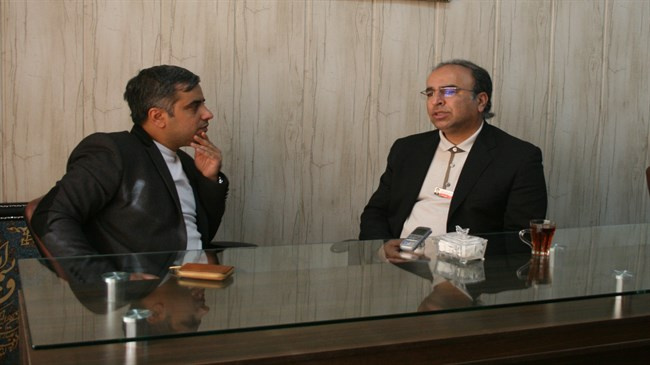YRSI’s deputy: Iran’s biggest infertility treatment center under construction in Yazd

By Sadeq Dehqan & Farzam Vanaki
Iran’s biggest infertility treatment center is expected to be launched in the central province of Yazd to meet the soaring demand for such services.
This was announced by Mohammad-Ali Abdoli, the deputy head of Yazd Research and Clinical Center for Infertility – also known as Yazd Reproductive Sciences Institute (YRSI), in an exclusive interview with Iran Daily.
The growing public demand for infertility and reproductive services provided by YRSI has convinced the country’s health officials to improve the institute’s medical facilities and environment.
Commenting on the YRSI’s activities amid the outbreak of the coronavirus pandemic in the country, Abdoli said the center is simultaneously providing couples with online services and conducting research on the virus’ impacts on the reproductive ability of the infected.
He noted that located in Yazd Province, the institute is the country’s infertility treatment hub.
The center began its activities long before Royan Institute – another Iranian clinical, research and educational institute dedicated to biomedical, translational and clinical researches, stem cell research and infertility treatment – and many other similar scientific and academic centers start their work in the field of treating infertility in the Iranian capital of Tehran.
In 1989, a number of the specialists in Yazd Province’s Shahid Sadoughi University of Medical Sciences established the center. In 2000, the Ministry of Health and Medical Education selected the center as the country’s hub in the fields of treating infertility and reproductive sciences. It has been selected as the country’s top research center and received many prizes.
Abdoli has had different positions in the institute since the beginning of its establishment and is one of its researchers.
The full text of the interview follows:
IRAN DAILY: Would you please tell us about the historical background of the institute and its therapeutic activities?
MOHAMMAD-ALI ABDOLI: Having begun its activities in 1989, the center is the first institute in the country founded to treat infertility. In 1990, the first fetus conceived through in vitro fertilization (IVF) in Iran by this center in 1989 – two years after the first similar experience in the world – was born. This baby has grown up and has a twin, who are considered the center’s grandchildren.
The institute consists of three research centers each focused on a different field of research: 1. Research and Clinical Center for Infertility, 2. Research Abortion Center and 3. Research Center for Stem Cell Biology.
It employs the world’s latest technologies in the field of infertility treatment and has very close connections with similar centers in other countries. In our biennial international congress attended by the world’s prominent professors and experts, the world’s modern techniques and latest achievements in the field of reproductive sciences are presented.
Our Research Center for Stem Cell Biology has conducted a large number of studies on stem cells. Among our achievements in this field have been creating a cell bank and classifying stem cells.
At present, 30 students are taking the specialized course of reproductive biology at the institute, who will, after graduation, serve as specialists and academics at the country’s scientific and treatment centers. The institute has developed the reproductive biology course for the first time in Iran.
What have been the results of the institute’ studies on stem cells?
The results of our studies on stem cells will help us solve a large number of the unresolved problems in the field of reproductive sciences. We are achieving good results in these fields and seek to solve problems pertaining to egg cell and sperm, their binding and the creation of embryo using stem cells. We are also doing research on recurrent miscarriage and other issues pertaining to reproduction. Our studies on stem cells are not limited to the field of reproduction. The institute has, for the first time in the world, managed to treat brain hemorrhage and stroke in animal models using stem cells.
What have been the impacts of the coronavirus outbreak on your activities and provision of services? Have you conducted any study on this virus?
Given the spread of the virus in the country and the necessity of maintaining social distancing, we are providing our treatment services via an online system at web.ssu.ac.ir.
In addition, we are carrying out a number of researches on the coronavirus impacts on infertility extent in the patients and whether the virus can be transmitted through gametes.
Why has Yazd Province been a pioneer in the field of infertility treatment and reproductive sciences?
This is because of the efforts by the professors and specialists, such as Abbas Aflatoonian and Mohammad-Ali Karimzadeh, who have lived in Yazd. They purchased IVF equipment and transferred the technology to Iran.
Is Yazd still the country’s hub for treating infertility given the establishment of similar centers, particularly, in Tehran?
The province is the pioneer of infertility treatment in Iran, and remains the country’s hub in the field.
In addition, many of the infertility treatment techniques currently used in Iran were employed and proved effective for the first time in the country in Yazd Province.
Is the center capable of meeting the patients’ demands for infertility and reproductive services?
Annually, close to 12,000 infertile couples are referred to the center, of which 95 percent are from other cities. We have a very good hostel, which is located next to the institute and has all the necessary amenities. It provides patients with temporary accommodations.
This comes as our reception and treatment capacities fail to be on a par with the patients’ demands. To resolve this problem, a complex with a floor area of 18,000 square meters is under construction next to Shahid Sadoughi Hospital in Yazd, which is 60 percent complete. Being the largest in the country, the complex is expected to become operational in two years. The completion of the complex will lead to a 10-fold rise in the current level of the services which the province provides infertile couples.
Source:Iran Daily

